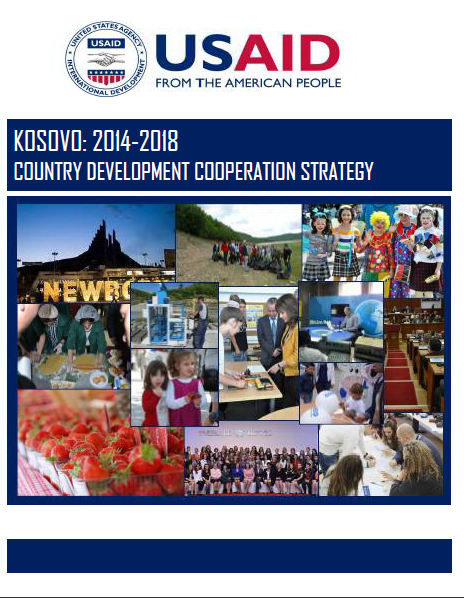USAID’s FY 2014 – FY 2018 Strategy is designed to support the achievement of the USG’s central foreign policy objective of peace and stability in the Balkans. In order for Kosovo to become a successful nation, it will have to build the capacity of its governing institutions, strengthen its economy, and improve the education and skills of its citizens. Only by achieving these interconnected objectives will Kosovo be able to integrate into Western European and Trans-Atlantic structures, while ensuring prosperity and stability at home for all of its people. The intention of USAID, which enjoys exceptionally good in-country access, is to continue to work side-by-side with Kosovo institutions and other donors towards this end.
Kosovo - Country Development Cooperation Strategy ![]() (pdf - 3 MB)
(pdf - 3 MB)
This Strategy proposes as an overarching Goal that “Kosovo Becomes an Increasingly Prosperous Country, Progressively Integrating into the Euro-Atlantic Community, with More Effective and Accountable Governance”. This Goal stems directly from Government of Kosovo (GOK) plans that call for advancing economic growth and strengthening institutions for the benefit of all citizens. It is in harmony with the USG’s recently approved Integrated Country Strategy for Kosovo (FY 2014-2016) which calls for continued engagement and development assistance to Kosovo, in order to ensure “…that this corner of the Balkans, long troubled with inter-ethnic tension and violence, joins a Europe whole, free, and at peace.” It is also aligned with the USAID/Department of State’s Joint Regional Strategy, which articulates the Administration’s commitment “…to seeing the Balkans fully integrated into EuroAtlantic institutions as part of a democratic and prosperous Europe.”
Development Objective (DO) 1: Improved Rule of Law and Governance that Meet Citizens’ Needs. This DO has been selected given the current state of nascent democratic institutions in the country. Despite institutional reforms, implementation shortcomings continue, even while there is in place a generally adequate body of laws and regulations. Judicial independence and Rule of Law remain weak, and continuing inefficiencies in the system prevent the judiciary from effectively playing its proper role. Members of the National Assembly have limited capacity and technical skills to conduct analysis, draft legislation, and assure oversight. Progress in the devolution of authorities and responsibilities from the center is hampered by municipal administrations that are limited in their ability to efficiently provide public services, and by civil servants beholden to political interests. Given these circumstances, DO1 will focus on enhancing the implementation capabilities of the judicial, executive/local administrative, and legislative sectors, while at the same time addressing integration issues and enhanced “voice” for civil society.
DO2: Increased Investment and Private Sector Employment. Kosovo remains the poorest country in the region and suffers from extremely high unemployment. It is overly dependent on imports and has a very small export base. Energy shortages hamstring the economy, and responsible utilization of the country’s vast mineral base is hampered by confused, poorly implemented, or even non-existent regulatory frameworks. This DO will address the alleviation of these circumstances by promoting a more favorable business environment, by encouraging a more diversified economy lead by private sector growth, and by continuing to address the energy needs of the country.
DO3: Enhanced Human Capital. The education system in Kosovo fails to address the pedagogical and skills training needs of Europe’s youngest population, resulting in vast numbers of unemployed youth without the skills or training required of a growing economy. This DO will continue to focus on strengthening pre-university education, provide for participant training, and – if certain pre-conditions are met – work with the University of Pristina to improve management and pedagogy in key faculties.









Comment
Make a general inquiry or suggest an improvement.